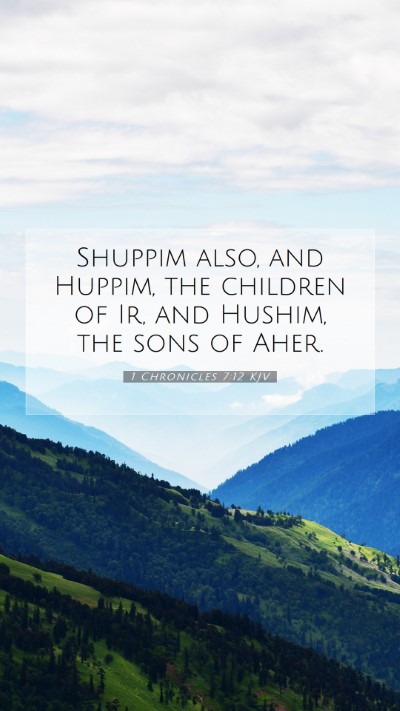Bible Verse Meaning and Commentary on 1 Chronicles 7:12
Bible Verse: 1 Chronicles 7:12 - "Ezraiah, the son of Jeroham, the son of Mahet, the son of Ahitub, the son of Abiathar." This verse is a genealogy that highlights the descendants of the priestly line of Abiathar.
Overview of the Verse
1 Chronicles 7:12 is part of a comprehensive genealogical record found in the book of Chronicles, which aims to establish the lineage of various tribes and family heads, emphasizing the importance of heritage and priestly lineages in Israel.
Insights from Public Domain Commentaries
Matthew Henry's Commentary
Matthew Henry highlights that genealogies like this serve to confirm God’s covenant promises to Israel and the significance of priestly families, specifically noting that they were chosen for divine service. The lineage of Abiathar signifies a continuation of priestly duties and responsibilities.
Albert Barnes' Notes
Albert Barnes points out that the listing of names in this verse demonstrates the methodical recording of the priestly line. He emphasizes that such genealogies were critical for maintaining the integrity of worship, as they established legitimacy and authority within the temple.
Adam Clarke's Commentary
Adam Clarke observes that this verse, although seemingly insignificant at first glance, carries weight in showing the ongoing legacy of the priesthood. Clarke underscores that recognizing these names fosters an understanding of the continuity and fidelity of God's promises to Abraham, Isaac, and Jacob, ensuring that the priestly lineage remains intact.
Key Themes and Analysis
- Lineage and Identity: This verse emphasizes the importance of ancestry and identity among God’s chosen people, showcasing how God remembers and preserves the lineages of His servants.
- Faithfulness of God: The continuity of the priestly line reflects God's faithfulness to Israel and His commitment to the covenant established with the forefathers.
- Religious Authority: Establishing proper genealogical records is vital to maintaining legitimate authority within Israel’s worship practices, making it a foundational aspect of community life and faith.
Applying the Verse to Daily Life
This verse draws attention to the significance of heritage and the value of preserving one's spiritual and family lineage. In modern times, individuals may reflect on their own families' legacies, understanding how past generations influence their current faith and practices.
Cross References
- 1 Samuel 22:20-23: Reference to Abiathar escaping to David and becoming a priest.
- Hebrews 7:14: Discussion on the priesthood of Jesus as being from the tribe of Judah, emphasizing new covenants.
- Ezra 7:1-5: More genealogical records pertaining to Ezra, who is part of the priestly lineage.
Conclusion
1 Chronicles 7:12 serves as a reminder of the significance of biblical genealogies in understanding God's plans and purposes. Through such records, believers can glean insights into God's faithfulness, the importance of history, and the role of authority in worship. This verse stands as an example of how genealogical study can enhance our Bible verse understanding and enrich our Bible study insights.
Further Study and Resources
If you're interested in deepening your understanding of Bible verses like this one, consider engaging in Bible study groups or utilizing online Bible study tools. Additional resources such as Bible study guides and Bible study lessons can help facilitate your exploration of genealogical themes and their relevance today.


